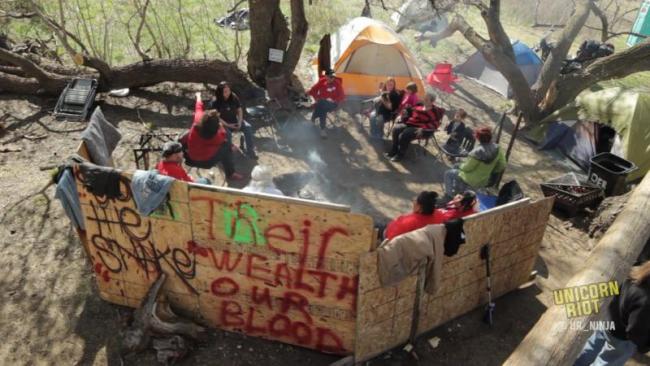Unions, Environmentalists Clash Over Dakota Pipeline

By Olivia Grady
Energy Transfer Partners started its project in 2014 to build the $3.7 billion Dakota Access pipeline near the Standing Rock Sioux Reservation. The pipeline would carry 470,000 barrels of oil a day from western North Dakota to Illinois. The company says the project will help the local economy and create 8,000 – 12,000 construction jobs.
Members of the Standing Rock Sioux tribe and environmental groups, however, have protested this pipeline. Tribal leaders argue the pipe would lead across ancestral burial grounds (which aren’t part of the reservation). Project critics also worry about possible environmental damage if the pipeline were to break near the Missouri River and the effect that would have on drinking water.
More than 400 protesters have been arrested, including actress Shailene Woodley, and over $3 million has been raised to oppose the pipeline. Other Hollywood actors, such as Susan Sarandon and Leonardo DiCaprio, have expressed support for the opposition, and more than one million Facebook users have checked into the reservation in solidarity. This was in part due to a false rumor that police were using Facebook to track the protesters.
President Barack Obama even weighed in on this controversy in an interview on November 1 with NowThis News, shared with MSNBC’s “The Last Word with Lawrence O’Donnell”: “We’re monitoring this closely, and you know I think that as a general rule my view is that there is a way for us to accommodate sacred lands of Native Americans.”
His administration on September 9 halted construction on the pipeline until more environmental assessments were done. The Department of Justice, the Army and the Interior Department will decide on the permitting decisions again under the National Environmental Policy Act.
The D.C. Circuit of the U.S. Court of Appeals on September 17 also stopped construction of the pipeline while the court considers a longer delay. The Standing Rock Sioux had sued the Army Corps of Engineers for granting permits for the pipeline on July 27 in the United States District Court for the District of Columbia.
Some unions are supporting the protests. The Labor Coalition for Community Action, which includes several labor groups like the Labor Council for Latin American Advancement, released a statement encouraging the protests:
We recognize this systematic oppression that so intimately resonates with many communities of color and marginalized populations, whether it be fighting for lead-free water in Flint to uncontaminated water in North Dakota.
We remain committed to fighting the corporate interests that back this project and name this pipeline “a pipeline of corporate greed.” We challenge the labor movement to strategize on how to better engage and include Native people and other marginalized populations into the labor movement as a whole.
Other unions however are in favor of the pipeline because it creates so many jobs. The AFL-CIO released a statement asking the Obama Administration to allow construction of the pipeline:
We believe that community involvement in decisions about constructing and locating pipelines is important and necessary, particularly in sensitive situations like those involving places of significance to Native Americans. However, once these processes have been completed, it is fundamentally unfair to hold union members’ livelihoods and their families’ financial security hostage to endless delay. The Dakota Access Pipeline is providing over 4,500 high-quality, family supporting jobs.
Laborers’ International Union of North America (LiUNA) President Terry O’Sullivan had even stronger words about the project:
It is deeply troubling that LIUNA members and fellow tradesmen and women, who are simply trying to do their jobs and put food on the table for their families, are facing intimidation and dangerous confrontations as protests against the Dakota Access Pipeline have intensified. Over the weekend, hundreds of protesters, illegally trespassing on private land, stormed an active construction site – risking their own injury as well as that of construction workers on site.
Both unions now supporting the pipeline however endorsed and financially supported President Obama’s campaign, the same man who is killing their members’ jobs now.
Typical for union leaders - take your money, kill your job.





